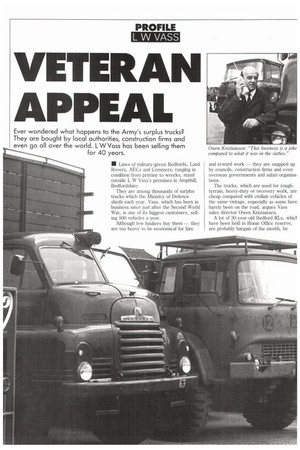VETERAN APPEAL
Page 48

Page 49

If you've noticed an error in this article please click here to report it so we can fix it.
• Lines of military-green Bedfords, Land Rovers, AECs and Cornrners, ranging in condition from pristine to wrecks, stand outside L W Vass's premises in Ampthill, Bedfordshire.
They are among thousands of surplus trucks which the Ministry of Defence sheds each year. Vass, which has been in business since just after the Second World War, is one of its biggest customers, selling 500 vehicles a year. Although few hauliers buy them — they are too heavy to be economical for hire and reward work — they are snapped up by councils, construction firms and even overseas governments and safari organisa, tions.
The trucks, which are used for roughterrain, heavy-duty or recovery work, are cheap compared with civilian vehicles of the same vintage, especially as some have barely been on the road, argues Vass sales director Owen Kristiansen.
A lot of 30-year-old Bedford RLs, whict have been held in Home Office reserve, are probably bargain of the month, he
says. They are going for £2,500 each, and are in near-perfect condition. A Bedford M-series seven-tonner 4x4, plated and painted to the customer's requirements, with 80,000Iun on the clock, costs £8,000. Its new AWD equivalent would retail at around £30,000, Kristiansen says.
The company has not always sold Army surplus. In fact, it became a dealer almost by accident when Leslie Vass, its founder, found it impossible to replace the trucks for his milling concern after the war.
He heard the US army was selling surplus trucks and bought three GMC 6x6s from a base at Great Missenden for 27 pounds, 10 shillings each. At this time, there was a great shortage of commercial vehicles throughout the Commonwealth, and Vass discovered that, with the right connections, he could sell the old US trucks for a profit.
ENTREPRENEURS
"It was a time of entrepreneurs," says Kristiansen. "At the end of the war there were vast amounts of surplus goods. One guy bought all the motor bikes. Another bought all the orange juice. Vass knew a New Zealander, Ray Vincent, who wanted vehicles exported there. There was also an Arab trader from Kuwait, who bought surplus machine tools and vehicles."
Today, Vass claims to be the biggest used army vehicle specialist in the UK. It stocks about 400 trucks at any one time. About 70% of its sales are of Bedfords — the standard 4 x 4 truck of the Army for generations. These are in service all over the world.
After the war, 80% of Vass's sales were abroad. Now, because of higher export and shipping costs, this has dropped to 40%. It sells far fewer vehicles than in its most successful period, the 1950s and 1960s, when it stocked 1,100 trucks.
Most of its home sales are to civil engineering companies, which use the trucks for site work, and local authorities which convert them to salt spreaders. Its customers include the owners of shooting estates, the organisers of war-games weekends and St John's Ambulance.
Vass has extensive workshops and can repaint and repair vehicles for plating, and has a spares capacity. Vauxhall's Luton plant, which stocks Bedford spares, is only 15Iun away.
Abroad, it sells to safari organisers and governments in East Africa. It has just prepared an order for army training vehicles for Zambia, which have been prepared to military specification. The BBC has bought a truck to take to Ascension Island. Bedfords are known worldwide for rugged service, ease of maintenance and cheap spares, says Kristiansen, a reputation they gained from their war service. Although the Army no longer buys Bedfords for its four-tonne fleet, they will be available for 15 years, he says, and Vass will continue buying the Bedfords' Leyland Daf replacements.
The company also stocks Leylands, Albions, Karriers, Commers and Austins. It sells AECs as recovery vehicles; an AEC Militant Mark III with hydraulic winch costs £9,000 fully-fitted for the road. A "collector's" Leyland Hippo, with wartime chassis cab, is going for £1,200.
The Army used to sell its surplus vehicles direct, but now this is done by approved private auctioneers. Vass is informed by the MoD of all sales by auction or tender and Kristiansen travels to centres as far away as Leeds.
In the old days, all surplus vehicles were sold at Ruddington in Nottinghamshire, and Vass would spend £80,000 at one time on up to 120 vehicles. But the trucks have become more expensive and customers — especially overseas — fewer. "Our company and this business is a joke compared to what it was in the sixties," says Kristiansen. He blames the slump in foreign sales on the fact that most developing countries are now either developed, and buying new trucks, or penniless, and unable to afford even secondhand ones. Also New Zealand and Australia tend now to buy from the US west coast.
Kristiansen has been with the company since 1961 and says he took it out of the "pre-war age". Workshops were redesigned with pits and cranes and a paintshop was added. Vass's premises, however, still have an air of the past, with cluttered sheds housing dusty vehicles.
Kristiansen darts from workshop to workshop discussing a deal with a customer on a mobile phone which looks incongruous among the 1950s trucks.
Oddly, Vass even supplies the Army's caterer, the Naafi, with vehicles, as it is not allowed to buy from the MoD direct. El by Murdo Morrison
































































































































